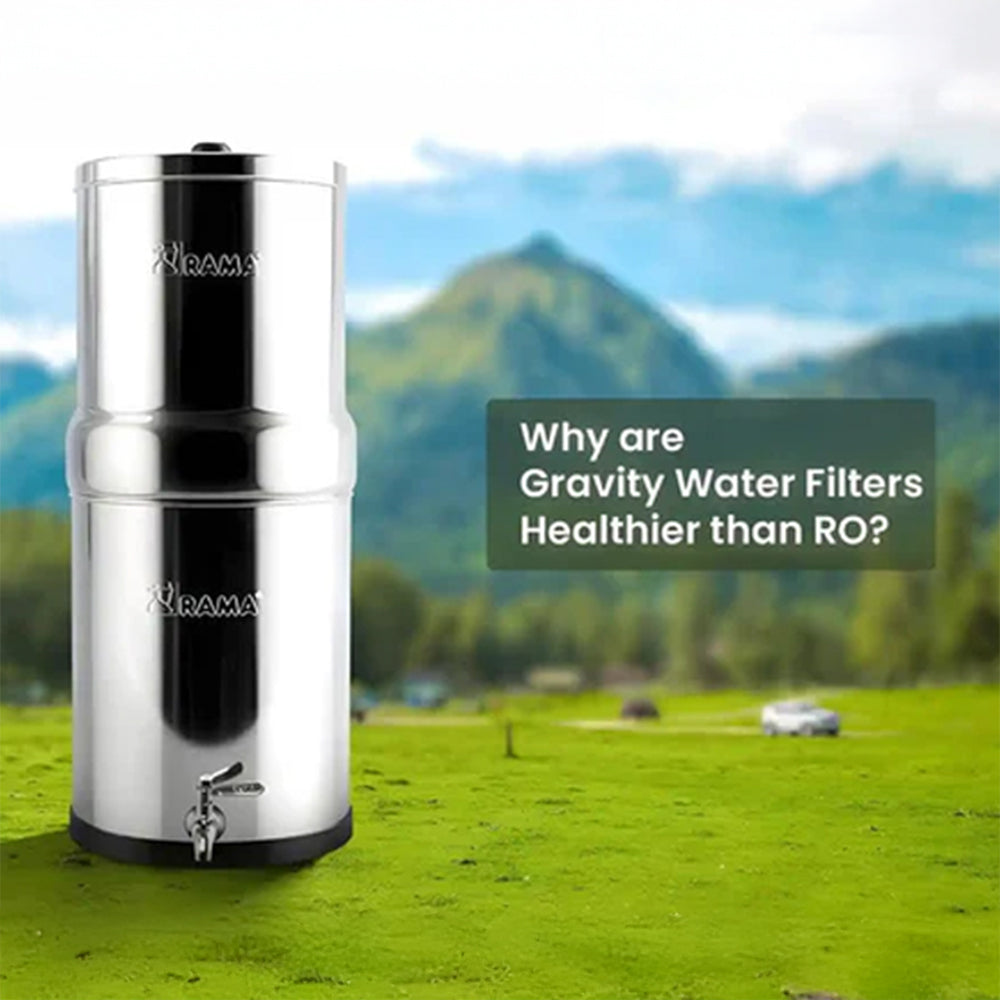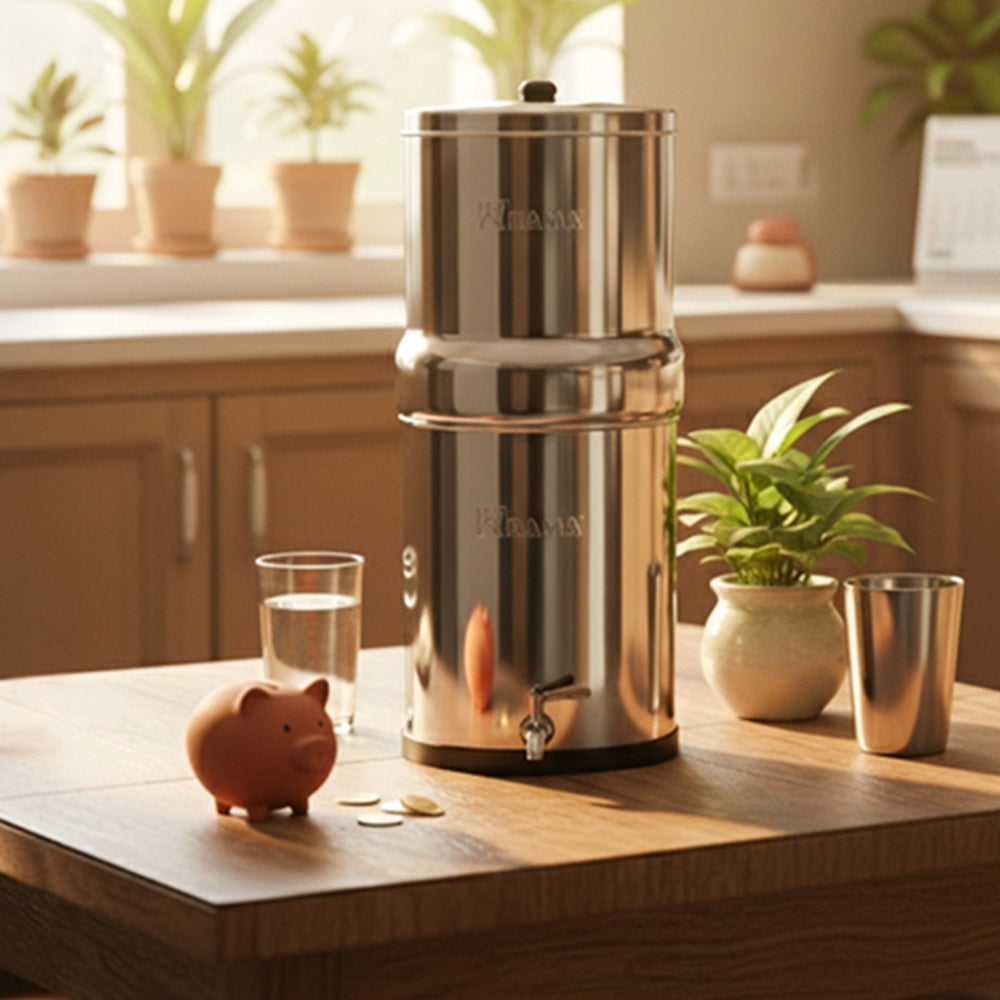Electric Or Non-Electric Water Filters: The Ultimate Showdown for Clean Water
 Unfiltered tap water isn’t safe for drinking or cooking. It can affect your health and overall well-being. However, tap water is the most common water source in Indian households. So, what do you do? How do you ensure access to safe and clean drinking water?
Unfiltered tap water isn’t safe for drinking or cooking. It can affect your health and overall well-being. However, tap water is the most common water source in Indian households. So, what do you do? How do you ensure access to safe and clean drinking water?
Water filters are here to help. They purify unfiltered water to eliminate bacteria, viruses, and other harmful contaminants and provide clean and safe drinking water.
However, simply knowing that water filters can solve your problem isn’t enough. You must also know how to choose the right filter to suit your requirements from among the various types available in the market.
There are two main types of water filters: electric and non-electric. This article explores the differences between the two to help you make an informed decision.
What is an electric water filter?
As the name suggests, an electric water filter uses electricity to produce clean and pure water. It relies on technologies like reverse osmosis (RO), ultrafiltration (UF), ultraviolet (UV), or a combination of all to eliminate disease-causing viruses and bacteria from the water.
Today’s electric water purifying systems use advanced technologies to ensure water is devoid of impurities and viruses. The RO and UV water filtration process includes multiple layers of filters: sediment filter, mesh filter, RO membrane, pre-RO carbon filter, microfilter, UV chamber, and post-RO carbon filter. These advanced filtration stages require electricity to push input water through the different filter layers and produce safe and pure drinking water.
Advantages of an electric water filter
Eliminates heavy metals
Large volumes of heavy metals like mercury, lead, and cadmium may be present in groundwater. An electric water filter’s carbon filter can eliminate these impurities from your water supply.
Protects against risky waterborne diseases
Unfiltered drinking water contains hazardous viruses and bacteria. RO-based electric water filters use a layer with invisible pores for water filtration. This layer cleanses the water of several dangerous germs, fungi, parasites, viruses, and bacteria.
Better for high TDS water
Borwell or groundwater are common water sources in India. The total dissolved solids (TDS) level in these water sources is comparatively higher than that of tank or municipal water. RO water filters are the right choice for water sources with TDS levels of more than 300 parts per million (ppm), as only RO technology can remove high levels of TDS.
Enhances the taste of water
Water derived directly from rivers or lakes is salty because it contains minerals, salts, and other organic compounds. Electric water filters can improve water taste by removing unwanted contaminants and minerals.
Disadvantages of an electric water filter
Initial cost and maintenance expenses
Electric water filters are usually more expensive to buy and maintain because they use advanced components like filters and membranes. You will need to spend on professional maintenance to replace filters and clean the device.
Water wastage
RO water filters waste a significant amount of water, around 3 liters for every 1 liter purified, during filtration. This drawback makes the filter harmful to the environment.
Consumption of energy
Energy is consumed during the manufacturing and operation of water filters. RO and UV-based units depend on electricity. Thus, they contribute to higher carbon emissions indirectly.
Time
Electric water filters push water through 6 to 7 filtration stages. This process takes time, resulting in a longer wait before a pitcher or faucet fills with drinking water.
Installation complexity
The installation of an electric water filter often requires professional assistance. You will need to call a representative from the company, which can add to the setup time and cost.
What is a non-electric water filter?
Non-electric water filters, as the name suggests, function without electricity. They depend on manual operation, gravity, or natural water filtration processes. Their ideal use is in areas where access to electricity is limited.
The water filters use carbon, sediment, and particulate filters to remove impurities. Generally, the placement of these filters is one after the other to remove harmful compounds like microbes, dissolved chemicals, suspended matter, sand, and silt from the water. While non-electric water filters don’t use electricity, they deliver safe and clean drinking water effectively.
Advantages of a non-electric water filter
Easier installation and maintenance
Non-electric water filters don’t require any professional installation. You can simply start using them after placing them at your desired spot on the kitchen counter. Their maintenance is also easier on the pocket.
Retains essential minerals
Electric water filters rely on several synthesized and chemical methods to purify water. However, non-electric water filters refrain from using such processes. As a result, your drinking water doesn’t lose essential minerals such as iron, magnesium, calcium, and zinc.
Portability
Non-electric water filters don’t require a continuous supply of electricity. Therefore, they don’t need to be fixed at a particular place. They are highly portable and can be moved from one place to another based on your convenience.
No water wastage
Non-electric water filters, unlike RO water purifying systems, don’t waste water during filtration. As a result, they are an eco-friendly alternative for water filtration.
Doesn’t require electricity
Non-electric water purifying systems don’t use electricity. Therefore, they can work 24/7, even during power cuts and in areas without reliable electricity supply.
Disadvantages of a non-electric water filter
Suitable for municipal water only
You can use non-electric water filters when TDS levels are within consumable limits. The filtration system is not effective for high TDS water, as it may not eliminate heavy metals or dissolved salts.
Limited filtration capability
Non-electric water filters can eliminate pesticides, bacteria, and bad odor but can’t remove viruses or certain harmful contaminants effectively. Their focus is on basic filtration for dirt, chlorine, and bacteria.
Requires frequent device cleaning and filter replacement
The filters of non-electric water filters require regular cleaning or replacement. If you do not do it on time, the filter’s performance can deteriorate.
Slower filtration rate
The filter relies on gravity or natural processes for filtering. Thus, the filtration rate can be slower than that of electric models.
Electric vs Non-Electric Water Filters
|
Parameter |
Electric Water filter |
Non-Electric Water filter |
|
Power Requirement |
Yes |
No |
|
Technology Used |
RO, UV, UF |
Activated carbon filters or gravity-based |
|
Filtration Capability |
Removes bacteria, viruses, and heavy metals |
Eliminates dirt, bacteria, and chlorine |
|
Suitable For |
Areas with high contamination or TDS |
Areas with minimal contamination and low TDS |
|
Water Pressure Requirement |
Requires a certain water pressure for operation |
Works even with low-pressure or stored water |
|
Maintenance Cost |
Higher due to complex filters |
Lower |
|
Water Wastage |
Some models, like RO, waste significant quantities of water |
Zero to little water wastage |
|
Installation |
Needs professional installation |
Easy to set up on your own |
|
Cost |
Expensive; Heavy on the pocket |
Budget-friendly; More affordable |
|
Best Use Case |
Households with highly polluted or hard water |
Households with relatively clean water supply |
Factors to consider when choosing a Water Filter
Water quality in your area
Knowing your water is the first and foremost step in choosing the right water filter. You must know the source of water supplied to your home and how reliable it is. You could receive water from a borewell, municipal water supply, natural sources like ponds or rivers, water tanks, or a mixture of municipal and tanker water. Each type requires a different filtration process.
Daily water consumption
The water needs for bigger families (4+ persons) are much more than for smaller ones. To meet your daily consumption, you must buy a water filter with adequate capacity. You must also consider periods of high activity, like large gatherings, to ensure there’s never a water shortage.
Power availability
Some areas do not have a continuous electricity supply. This factor is crucial in deciding between an electric water filter and a non-electric water filter. If there is an electricity shortage in your area, you must opt for a non-electric water filter to enjoy safe and clean drinking water all the time.
Budget
A water filter isn’t a one-time investment. You must spend on its maintenance, too. You must change the filters frequently, which leads to added expenses. Sometimes, the maintenance cost can exceed the initial purchase cost of the water filter. Thus, remember to factor in all the costs before making a decision.
Additional features: Determine if you need features like mineralization or heating
Some water filters have advanced features like a mineral booster, heating, digital sterilizing care, LED display, 2-in-1 water solution, etc. Evaluate your requirements against each of these features to make an informed decision.
Which of the two is better?
Both electric and non-electric water filters can produce clean and safe drinking water. However, non-electric water filters are superior as they remove several impurities and retain essential minerals without wasting water during filtration. The device functions without electricity, making it the right choice for areas with frequent power outages.
Rama Pure Water offers one of the best non-electric stainless steel water filters with a multi-stage filtration system to eliminate 99.99% bacteria and viruses and 99.9% lead, chlorine, and heavy metals. The filter’s filtration process is gravity-based and chemical-free.
Unlike RO filters, it does not waste any water during filtration. The upper and lower chambers have a 10-liter capacity each, making the device’s total storage capacity 20 liters, sufficient for a big family of 4 to 6 members. Every pair of spirit candles has a lifespan of 6000 liters, which means you do not have to spend frequently on maintenance.
Conclusion
You must drink clean drinking water, as it affects many body parts and functions, including the digestive system. A water filter, whether electric or non-electric, can serve the purpose of disinfecting water. But each type comes with its pros and cons.
Get your Rama Pure Water’s best non-electric stainless steel water filter today to enjoy clean and safe drinking water despite a limited electricity supply. The water filter fulfills your requirements 24/7.





